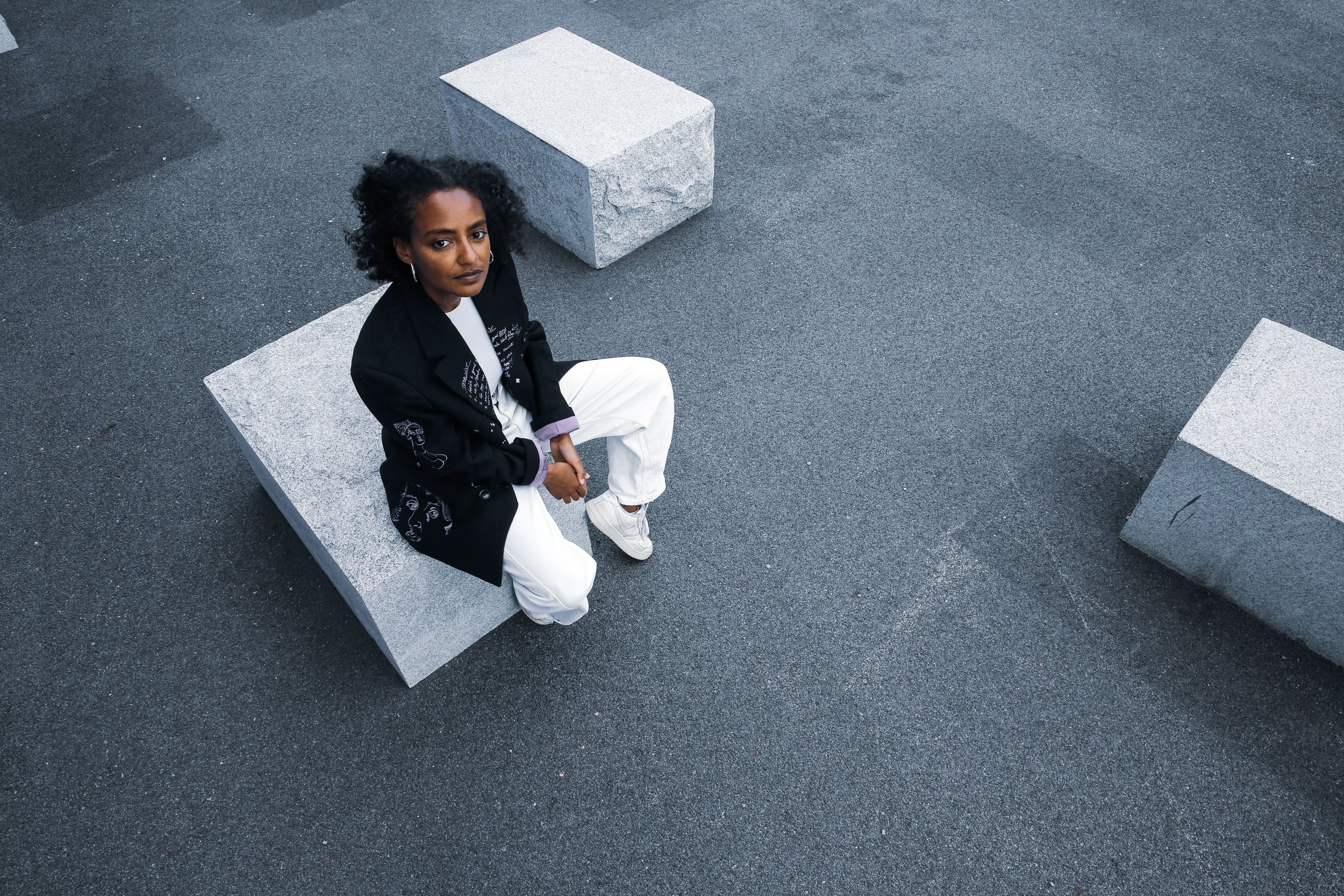
Love lifts you up. No, like, it lifts you… UP. One moment you’re bored, floating on the board, looking around at a horizon that’s drifting from familiar to tedious, the next moment you’re cast in shadow, paddling your skinny little arms because your life does depend on it, ascending to the heavens on a wall of water. And if the current or the speed doesn’t annihilate you, it’s a magnificent view. You can see everything, you’re hitting forty miles an hour, it’s the most terrifying and beautiful thing you have ever experienced. Love lifts you into this splendor, into this animal fear. Catch a wave and you’re sitting on top of the world, yes that’s true. But isn’t it also a little lonely at the top?
Aïda Mekonnen Caby calls out for another one in another tongue with Mais Uma, a collection of songs that exquisitely details a transformation from a gig-weary New York City native bandmate to assured front-and-center songwriter walking the unfamiliar avenidas and praias of Portugal after an international feet-sweeping. Prior to this debut, Caby née Mekonnen played in bands and on a handful of records, most notably the group Forever Honey whose ultra jangly guitar sound was a regular fixture at weekday gigs in venues you’ve heard of. It was fun, sure, and the music was often great, but for Caby a nagging feeling emerged on the long schlep home: this gear is heavy, the train’s running late, maybe there’s something else? And then she caught that wave.
There’s a particular loneliness inherent to the experience of living abroad, particularly when you don’t speak the language, and wrestling with this disassociation runs through the songs. For Caby, music went from an organizing social principle — being in a band is mostly hanging out, after all — to something that helped process, helped make sense of this new corner of the world. The album poses an interesting question: when you put on your headphones, are you less lonely than you were before? Sure, there’s a human comfort in listening to your familiar songwriters — your Elliot Smiths, your Andy Shaufs, your Grant Lee Buffalos. They can provide you with melodies and words in your own language, like a hand reaching out. But within your headphones you are then all the more isolated from the world around you, shutting yourself out from incidental voices, the presence of words you might learn to recognize. In listening and writing Caby found steadier footing both abroad and as the centerpoint of a project — she had contributed songs to bands before, but she’s never been directly in the singular spotlight, not until now.
Enter the wunderkind duo Toledo who in addition to their sparkly, harmony-rich, toe-tapping catalog have started in on an impressive run as producers and collaborators out of their Brooklyn basement studio. Aïda, Dan, and Jordan met during sessions for the band Work Wife — Caby came in to rip guitar and the boys knew immediately she was cool, she brought in a Rickenbacker. Aïda sent them some demos and their collective enthusiasm bloomed into this entire LP, bursting with boutique vocal treatments, expert-level rhythm section takes, wah pedal in unexpected places, and esoteric Russian synthesizer lines. It’s an easy, equal partnership that preserves the original diaristic thrust of Caby’s demos — some of the original stems from her initial recordings made it onto the final product. The songs feel intimate — they’re hardly sung above a whisper — and though there is an undeniable Toledo quality to the production, these recordings are darker and more cinematic, brooding alongside groups like Widowspeak or Trace Mountains. One can hear both the confessional influence of songwriters like Greg Mendez and PJ Harvey’s confrontational energy, other songwriters that anchored Caby’s writing process. But none of these allusions really capture the whole of it — it’s as if the sounds and performances themselves were run back and forth through translation a hundred times, resulting in something lovely, alien, familiar, and very reassuring piped into a pair of headphones.
It is love, languages, and love languages that are the sun of this album’s flower. In the first track, she hits us in the chorus with a marvelously craggy word from Iceland: Fjaðrárgljúfur, that is the hook, apparently the word translates to “Feather River Canyon” and is the name of a beautiful space. What a wonderful trick it is to immediately disorient the listener — we, too, struggle to understand something in translation. She addresses language again on the closing track, singing “I’m just under the surface / I’m just finding the meaning of things.” And then listen closely: near the end of “Tears of the Drum Machine,” you’ll hear an unusual texture bubbling up under the climax. Words, in fact a recording of Aïda’s partner translating the lyrics of the song into French. Awaiting this album’s release, she’s made a habit of teaching herself French from old variété française songs. Love makes sense of it, love speaks new languages, love lifts you up.
